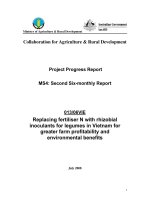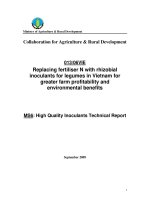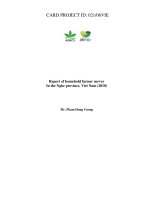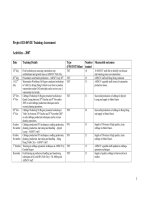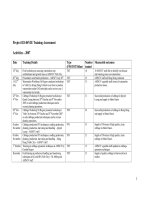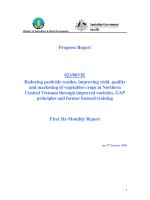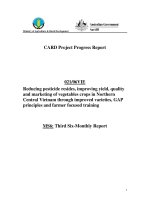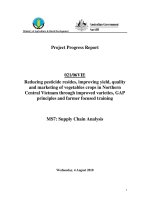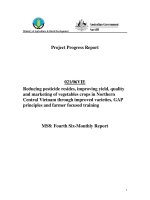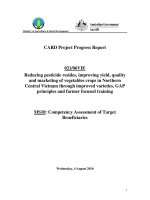Báo cáo khoa học nông nghiệp " Capacity Building in Applied Natural Resource Economics and Management for Vietnam " MS2 ppt
Bạn đang xem bản rút gọn của tài liệu. Xem và tải ngay bản đầy đủ của tài liệu tại đây (70.42 KB, 9 trang )
Ministry of Agriculture & Rural Development
CARD Project Progress Report
025/05VIE
Capacity Building in Applied Natural Resource
Economics and Management for Vietnam
MS2: FIRST SIX-MONTHLY REPORT
11th December 2006
1. Institute Information
Project Name
Capacity Building in Applied Natural Resource
Economics and Management for Vietnam
Vietnamese Institution
Faculty of Economics and Rural Development,
Hanoi Agricultural University
Gialam, Hanoi, Vietnam
Vietnamese Project Team Leader
Mr. Tran Dinh Thao
Australian Organisation
Faculty of Agriculture, Food and Natural Resources
University of Sydney, NSW, 2006, Australia
Australian Personnel
Professor Thomas Gordon MacAulay
Date commenced
January 1, 2006
Completion date (original)
June 30, 2008
Completion date (revised)
Reporting period
6 Months
Contact Officer(s)
In Australia: Team Leader
Name:
Prof. Thomas Gordon
MacAulay
Telephone:
61 2 9351 8547
Position:
Professor
Fax:
61 2 9351 8562
Organisation
Faculty of Agriculture, Food
and
Email:
Natural Resources University
of Sydney, NSW 2006,
Australia
Also contact to Ms Annette
Vervoort (as above)
In Australia: Administrative contact
Name:
Ms. Luda Kuchieva
Telephone:
61 2 9351 7903
Position:
Administration officer
Fax:
61 2 9351 3256
Organisation
Research Grants
Email:
University of Sydney,
NSW 2006, Australia
In Vietnam
Name:
Mr. Tran Dinh Thao
Telephone:
84 48 769 770
Position:
Senior Lecturer, Head of
Fax:
84 48 276 554
Department
Organisation
Faculty of Economics and
Rural Development Hanoi
Agricultural University
Email:
Or
Gialam, Hanoi, Vietnam
2. Project Abstract
With very rapid growth and development in Vietnam, there is a danger of overuse and
mismanagement of natural resources, thus compromising sustainable development. The
level of knowledge, understanding and use of the principles of natural resource
economics (NRE) and management is limited in Vietnamese agriculture. The designed
outcome of the project is to begin to have resource management concepts used in various
institutions in Vietnam (Universities, MARD, and the extension system) and to
strengthen the ability to deliver knowledge, set policies and advise farmers in this area.
This will be approached through a participatory approach using workshops in Vietnam on
NRE held by the University of Sydney staff and then staff of the participating
organizations. Two training workshops have already been held in Hanoi and Can Tho,
Vietnam. Two of the Vietnamese scholars had three months visit to the University of
Sydney so as to broaden their understanding of NRE. In the next stage, extension
workshops at the provincial level will be held by Vietnamese staff, thus transferring the
acquired knowledge to extension specialists and thereby to smallholder farmers. In the
final stage, a limited number of training workshops with farmers will be conducted to
demonstrate the use of practical knowledge and skills in resource management.
3. Executive Summary
The project is aimed at strengthening the teaching and research capacity in the field of
natural resource economics in several key Vietnamese Institutions (Universities, MARD)
and encourage the transfer of knowledge from the University teaching and research staff
to extension staff. The project is designed to strengthen the use of resource management
concepts in Vietnam through a participatory approach using workshops in Vietnam on
Natural Resource Economics in three stages.
The first stage of the project, that is, institutional capacity building has been approached
through conducting training workshops by staff of The University of Sydney in Hanoi
and Can Tho with a group of academics in Hanoi Agricultural University (26
participants), and Can Tho University (19 participants). The aim of the workshops was to
enhance the capacity of the participants to pass on the acquired knowledge to extension
specialists.
Two research scholars from Vietnam travelled to The University of Sydney (Ms.Le Thi
Kim Lien and Ms. Do Thi Den) for a period of three months, and completed research
projects related to the development of case studies for use in the training workshops.
The approach to be used in the second stage of the project is to conduct Extension
Workshops in the North and South with a maximum of 30 extension specialists per
training session of about one week each. The workshops will be run by selected
participants in the earlier Trainer Workshops held in Hanoi and Can Tho. In the third
stage of the project, pilot extension workshops for farmers will be conducted with a focus
on economically efficient natural resource management, where practical knowledge and
skills in resource management will be demonstrated.
4. Introduction & Background
As Vietnam is experiencing rapid development and exposure to markets, enormous
pressure is put on the nation’s natural resources. Because of market imperfections and
failures, especially with respect to various natural resources, there is a danger of resource
overuse and collapse, resulting in economic inefficiencies, and social and environmental
problems.
Adequate knowledge of economics and the management of natural resources becomes a
crucial factor in the quest for stable and sustainable long-term development. Such
knowledge is lacking at the academic, research and extension levels. This project will
strengthen the teaching and research capacity in the field of natural resource economics
in several key Vietnamese institutions of higher education (Hanoi Agricultural University
(HAU), Hue College of Economics (HCE), Can Tho University (CTU) and the Ministry
of Agriculture and Rural Development (MARD), Xuanmai Forestry University, Thai
Nguyen University, National Centre for Extension, and the College for Agriculture and
Rural Development Managers). This will be accomplished through assistance in
curriculum development and course design and transfer of research expertise. The project
is also designed to foster links between the Universities and extension system and will
encourage the transfer of knowledge from the university teaching and research staff to the
extension staff. The University of Sydney staff members who are part of the team are
currently involved in teaching and research activities involving water, land and fisheries
economics, as well as the economics of the environment and sustainable development.
1. 4.1 Project Objective: The project links to the CARD strategic objective 2.1 of
increasing rural productivity and particularly 2.1.1 of increasing agricultural efficiency
and competitiveness. The project also links to strategic objectives 2.4 of reducing
vulnerability to environmental and economic shocks and the intermediate objective 2.4.2
of increasing stability of household incomes through encouraging diversification of
production and marketing.
2. 4.2 Key Stakeholders: There are three levels of stakeholders/beneficiaries
(details of stakeholder analysis and expected impacts of the proposed activities are
provided in Annex 1 and Annex 2) that will be directly and indirectly targeted by the
project. The first level is comprised of academic, research and policy analysis staff at the
Vietnamese institutions of higher education (Hanoi Agricultural University (HAU), Hue
College of Economics (HCE), Can Tho University (CTU) and the Ministry of Agriculture
and Rural Development (MARD), Xuanmai Forestry University, Thai Nguyen
University, National Centre for Extension, and the College for Agriculture and Rural
Development Managers). They will benefit through training sessions in Vietnam held by
University of Sydney staff and through visits to Australia by four staff members from the
Vietnamese institutions. The aim is to specifically address their capacity to pass on the
acquired knowledge to the next level of beneficiaries – the extension specialists at the
provincial level and the Departments of Agriculture and Rural Development (DARD)
staff members. They will benefit through the workshops within this project conducted in
Vietnam by the Vietnamese universities. It is expected that this will result in
incorporating natural resource economics principles into the guidelines, directives and
advice that provincial level authorities provide for farmers. The transmission to farmers
will be through the district and community level extension specialists. Within the project,
several pilot workshops will be conducted at this level to initiate the knowledge transfer
process. The farmers are expected to directly benefit from these workshops through
gaining skills in efficient management of natural resources on the farm, as well as
sustainable farming practices.
3. 4.3 Project Approach: The proposed project is designed to strengthen capacity in
natural resource economics in Vietnam in a layered framework. In the first layer, and
after considerable consultation, the University of Sydney staff will provide research,
teaching and policy analysis training to Vietnamese academics, policy analysts and
extension specialists at a national level. This training will be in the context of the
problems and issues identified in the farmer surveys. In the second layer, those trained in
the first layer will train the extension specialists and policy analysts at a provincial level.
The training will be designed to impact the advice and information provided to farmers
on the use of natural resources. This will be demonstrated through a series of district level
workshops. In the third layer, pilot extension workshops for farmers will be conducted,
with a focus on economically efficient natural resource management. The University of
Sydney will provide assistance in this process through participation and input to the
curriculum design of the extension workshops. The approach to capacity building through
workshops and training sessions has been successfully implemented in a previous CARD
project (Pilot Program).
1. 4.3.1 Institutional Capacity Building: The approach to institutional capacity
building is through three types of activities: training workshops and curriculum
development at the level of Vietnamese institutions (Universities and MARD), visits of a
small number of staff from Vietnamese institutions to Australia, and fostering and
initiating joint research projects in the area of natural resource economics.
2. 4.3.2 Communication/Outreach Approach. The main approach to
communication/outreach is through extension workshops that will be conducted in the
Mekong Delta at Can Tho University, the Central Coast through Hue University and in
the north of Vietnam at Hanoi Agricultural University. These workshops will address the
strategic questions of strengthened and broadened capacity for natural resource
management training of extension personnel in Vietnam. Once this capacity is built it will
provide a continuing human resource base, which can be sustained into the future. This
will also result in an improved advisory capacity of the selected extension staff (emphasis
will be placed on ensuring a balance of both males and females are trained) and an
improved ability to provide advice with an economic content in relation to resource use at
the farm level.
3. 4.4 Methodology
4.4.1 R&D Methodology: The approach used in the proposed project is through research
into specific resource use issues designed to allow development of training modules for
use in knowledge transfer and knowledge base building. This will also feed into the
curriculum development process.
It is envisaged that the project will have a significant research component in the form of
economic analysis of the issues related to aquaculture, water use, land use and farm
forestry. A list of potential research projects is included in the Annex 3. The basic
approach will be to develop simple examples using computer simulation in spreadsheets
as applied to a variety of cases of on-farm resource issues.
4.4.2 Participatory Methods: On-going consultations with the major stakeholders will be
conducted in order to, in the first place determine the nature of the training and extension
activities, and subsequently to obtain feedback and then re-address some of the key
issues. This will assist in developing the priority areas for training. The expertise in
HAU in participatory extension will be fully utilised (Linh, 2004). The case study
material will be developed in consultation with extension personnel and a small number
of farmers. Care will be taken to also ensure a balance of males and females in these
consultations
5. Progress to Date
5.1 Implementation Highlights
-Inception meeting held (8
th
-14
th
January 2006). -Workshop
Curriculum and handbooks prepared for natural resource
management and extension Trainer Workshops. (Handbook
attached with the report)
-Trainer Workshops held in Hanoi with 26 participants and Can Tho with 19 participants
in July 2006 and Workshop evaluation reports were completed. (Refer to Annex 4-9 for
details)
-Two research scholars (Ms.Le Thi Kim Lien and Ms. Do Thi
Den) chosen and travelled to Sydney. -Mini research
projects initiated and completed by two Vietnamese
scholars. (Refer to Annex 10 and 11 for abstracts of these
research projects)
-Agricultural Knowledge Information System website established and database
implemented (o/card/index.php?newlang=english).
5.2 Smallholder Benefits
At this initial stage of the project the necessary investment is being made in training
academic staff in resource management so there has not been an impact at the
smallholder level at this stage. These impacts will be reflected in the pilot training at the
farmer level later in the project.
5.3 Capacity Building
The first stage of the project is about institutional capacity building designed to allow a
group of academics, particularly in Hanoi Agricultural University and Can Tho
University, but other universities as well, including Thai Nguyen, Vinh University,
Forestry University, Hue University, Hai Phong University and MARD. Two training
workshops have already been conducted in Hanoi and Can Tho by University of Sydney
academics.
Pre and post workshop competency tests were conducted among the participants to
compare their knowledge level before and after workshops. The results were very
satisfactory, in the post workshop competency tests. A survey was conducted to
determine the personal impressions of the participants toward the workshop outcome and
the evaluation results of the survey showed that the trainees were quite satisfied with the
workshop contents and quality. They seemed to be quite sure about getting positive
impacts in their future career development from knowledge gained during the workshop.
Two research scholars from Vietnam arrived at The University of Sydney, and have
completed research projects related to the development of case studies in resource use.
Ms. Do Thi Den, who arrived on 22
nd
July and departed on 22
nd
October 2006, carried out research entitled
“Technical Efficiency of Shrimp Farming in the Mekong Delta of Vietnam”. Similarly, another research scholar Ms. Le Thi Kim Lien,
who arrived on 27
th
August and departed on 1
st
Nov 2006, undertook a research project entitled “An Inquiry into Four
Alternative Systems of Shrimp Culture in the Lagoon area of Thua Thien, Hue,
Vietnam”.
5.4 Publicity
At each of the workshops, banners were used acknowledging both the participating
Universities and also CARD and AusAID funding. The Handbooks delivered at the
workshops all contained logos and acknowledgement of the source of funding from
AusAID through the CARD program.
Newspaper articles were obtained for both workshops in Hanoi and Can Tho. Two
articles on our project workshop in Can Tho were published in two newspapers: (a) Hau
Giang Newspaper, July 21: Capacity Building Project for Implementing and Managing
the Natural Resources Economics (Thuc hien du an nang cao nang luc kinh te va quan ly
tai nguyen thien nhien). (b) Can Tho Newspaper, July 25: Training on Natural Resources
Economics and Management (Boi duong kien thuc kinh te va quan ly tai nguyen thien
nhien).
Information on the workshop in the north was posted on 18 July on the web site of the
National Agricultural Extension Centre (NAEC), MARD. The link is as follows:
/>ksF rom=
5.5 Project Management
The project team in Sydney have set up a series of approximately fortnightly meetings
and link to the project team in Vietnam using email.
6. Report on Cross-Cutting Issues
6.1 Environment
As the current work on the project has involved training in resource use and related
environmental issues the effect of the work must be seen as positive in an environmental
context through the enhanced understanding that workshop participants have been given
of resource management and the related environmental issues. For example, issues of
water use, fisheries management and policy, forestry management, etc. were considered
in the training.
6.2 Gender and Social Issues
In the workshops the balance between males and females was as follows:
Hanoi 14 males and 12 females
Can Tho 12 males and 7 females
7. Implementation & Sustainability Issues
7.1 Issues and Constraints
Thus far there appears to be little in the way of constraints on the work relative to what
was planned. However, it is clear that significant time and effort is required for even
academics and administrative staff in government to gain an in-depth understanding of
resource management issues and their analysis. In this area progress was somewhat
slower than expected.
7.2 Options
a) Reduce the extent of coverage of material and provide a more intense level of training
in
specific areas.
b) Expand the number of sessions by using parallel teaching in the North and South.
However, none of the above are recommended at this stage.
7.3 Sustainability
The project is involved in human capacity building. The capacity developed will be
transmitted and sustained through use in academic institutions and eventually the
extension systems and to farmers.
8. Next Critical Steps
The project has achieved the relevant milestones as specified in the project proposal. The
next critical step is the preparation of curriculum and handbooks for the Extension
Workshops to be held in Hanoi and Can Tho in January 2007. One Extension Workshop
will be conducted in the North and one in the South with a maximum of 30 people per
training session of about one week each. It is a training program at the Provincial and
District level that will be run by selected members of those trained in the Trainer
workshops held in Hanoi and Can Tho.
